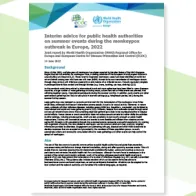ECDC and WHO produce risk communication and community engagement advice, toolkit for public health authorities and event organisers
Risk communication and community engagement approaches during the monkeypox outbreak in Europe, 2022 has been produced in light of recent public health emergencies that have reaffirmed the importance of risk communication and community engagement practices as a core public health intervention.
The current monkeypox outbreak is primarily affecting men who have sex with men (MSM). Direct communication and engagement with those at increased risk through two-way communication is essential while also ensuring timely and consistent health information and advice to broader populations is available. When public health authorities are developing response strategies, it is of the utmost importance that representatives of affected communities, such as civil society organisations or community-based organisations, are involved both in designing and adapting outreach strategies and key risk communication messages and leveraging the trust they have with at-risk groups. This ensures affected communities are empowered to protect themselves from the disease. Risk communication and community engagement approaches during the monkeypox outbreak in Europe, 2022 presents experiences from several countries that have been affected by this outbreak and can serve as examples to others that may be searching for ways to reach affected groups and collaborate with them in their public health response, whether in risk communication, contact tracing, or vaccination.
The Communication Toolkit for Event Organizers is aimed at both public health authorities and event organisers. It encourages both to work hand in hand with civil society organisations to reach out to people attending events, including at-risk groups, about monkeypox. This toolkit, jointly created by ECDC and WHO Regional Office for Europe, provides customisable tools for health information and advice on monkeypox for mass gatherings to be considered by public health authorities and event organisers. Mass gatherings do not amplify transmission by themselves – it is the behaviour during events that matters. As events may be a conducive environment for the transmission of monkeypox if they entail close, prolonged, and frequent interactions, especially sexual activity, targeting at-risk behaviour can help reduce the spread of monkeypox.
The toolkit includes technical guidance, key messages to share with eventgoers, talking points for event hosts, as well as social media tiles, posters, and information leaflets in an editable format to fit the needs of the intended audience.
Read more

Share this page


